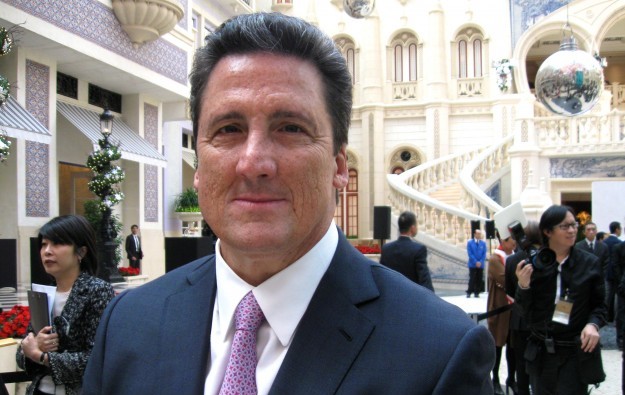IRs not linked to extra crime, MGM boss tells Japanese
Mar 02, 2015 Newsdesk Japan, Latest News, Top of the deck

There is “no demonstrated relationship between the introduction of an IR [integrated resort] and an increased rate of crime,” said a presentation by Bill Hornbuckle (pictured in a file photo), president of MGM Resorts International, at an investor forum in Tokyo on February 26.
Some lobby groups and politicians in Japan opposed to the introduction of casino resorts in the country have cited concerns it could lead to an increase in crime.
In February 2014, Bloomberg News reported that MGM Resorts might be willing to spend up to US$10 billion to build a large casino resort in Japan. Several investment analysts have suggested Japan could become the second largest casino market in Asia by gross gaming revenue – surpassed only by Macau – if casino legalisation could be pushed through the Japanese parliament, known as the Diet.
“Las Vegas, a town centered on the integrated resort industry, has an extremely low crime rate,” said Mr Hornbuckle’s presentation, delivered at the CLSA Japan Forum 2015, held in Tokyo by the brokerage between February 24 and 27.
The paper indicated that compared with five other major cities in the United States – New York, Miami, Atlanta, San Francisco and Los Angeles – Las Vegas actually recorded the third lowest rate of major crime at 37.8 cases per 10,000 people; and was third lowest among the selected cities for petty crime – known in the U.S. system as “misdemeanor crime” – at 88.7 cases per 10,000 people. The presentation didn’t mention the year the numbers were collected, but gave the source as Federal Bureau of Investigation crime statistics.
Mr Hornbuckle’s paper added that in Detroit, a northeastern U.S. city where MGM Resorts opened a casino venue called MGM Detroit in October 2007, the rate of crime – defined in that case as the total number of homicides and burglaries per 100,000 people – actually fell in 2008 and 2009.
“Problem and pathological gaming exists in all countries regardless of whether legal gaming is present or not, and the prevalence of problem and pathological gaming is generally the same without regard to culture or geography,” said Mr Hornbuckle’s presentation.
It added: “Dozens of surveys have been conducted in countries over the last two decades, and despite the difference in gaming options available to populations, studies have consistently shown about 1 percent to 2 percent of people are afflicted by a pathological gambling addiction.” The paper said the term “pathological gambling addiction” related to behaviour as defined by the American Psychiatric Association.
“The presence of casino gaming in Singapore combined with comprehensive education, public awareness and responsible gaming measures confirms that it is possible to significantly mitigate negative outcomes,” stated the MGM president’s presentation.
In January it was reported Singapore was considering allowing whole groups of locals to seek self-exclusion from the city-state’s two casino resorts. A number of Japanese lawmakers have referred to the “Singapore model” as a possible template for casino regulation in Japan.
MGM Resorts said in its paper to the CLSA conference that – as a company regulated in the U.S. – its operations are subjected to the scrutiny of the Financial Crimes Enforcement Network (FinCEN), a bureau of the U.S. Treasury, which administers and issues regulations under the U.S. Bank Secrecy Act, ensuring “casinos implement and maintain a robust compliance programme”.
Mr Hornbuckle is also an executive director of Macau casino developer and operator MGM China Holdings Ltd, which is 51-percent owned by MGM Resorts.
Mr Hornbuckle’s presentation comes as Japan prepares to hold regional elections in April.
GGRAsia reported last month that the Japan central government’s Cabinet and the Cabinet Secretariat appear to have distanced themselves from any direct involvement in preparation work ahead of possible legislation to permit casino venues in the country.
Related articles
-
 CLSA trims forecast for Macau GGR,...
CLSA trims forecast for Macau GGR,...Jul 17, 2024
-
 Pagcor to halt POGO hubs amidst...
Pagcor to halt POGO hubs amidst...Jul 11, 2024
More news
-
 Donaco EBITDA up y-o-y to above US$4mln...
Donaco EBITDA up y-o-y to above US$4mln...Jul 26, 2024
-
 HK listed Palasino upgrades Czech...
HK listed Palasino upgrades Czech...Jul 26, 2024
Latest News
Jul 26, 2024
Border-casino operator Donaco International Ltd has achieved a 164.17-percent year-on-year increase in its latest quarterly group earnings before interest, taxation, depreciation and amortisation...Sign up to our FREE Newsletter
 (Click here for more)
(Click here for more)
Pick of the Day
”We’ve got more traction outside of Macau at the moment. But Macau’s going be a bigger focus for us”
David Punter
Regional representative at Konami Australia
Most Popular
 Sheraton brand to exit Londoner Macao, to be Londoner Grand July 25, 2024
Sheraton brand to exit Londoner Macao, to be Londoner Grand July 25, 2024  Macau regulator probes unlicensed gaming agents July 24, 2024
Macau regulator probes unlicensed gaming agents July 24, 2024  Philippines gives 20k aliens in POGOs 60 days to leave July 25, 2024
Philippines gives 20k aliens in POGOs 60 days to leave July 25, 2024  Philippines-listed DigiPlus says not affected by POGO ban July 24, 2024
Philippines-listed DigiPlus says not affected by POGO ban July 24, 2024  Sands China 2Q EBITDA down q-o-q amid low hold, renovation July 25, 2024
Sands China 2Q EBITDA down q-o-q amid low hold, renovation July 25, 2024






